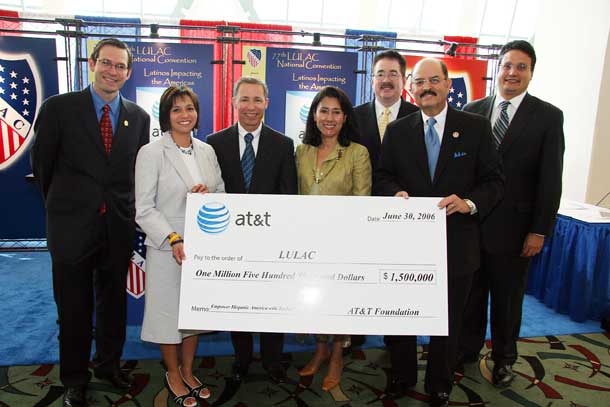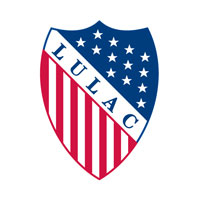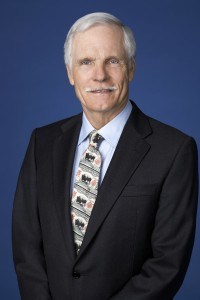
Reach Out and Touch Someone... With Cash
Stop the Cap! readers Terry and Scott write to let us know it was an Astroturf weekend in the pages of the New York Times‘ ‘Letters to the Editor’ section as two traditional allies in big telecom’s fight against Net Neutrality and broadband regulation blasted the newspaper’s recent pro-FCC regulatory authority editorial.
Mike Wendy, vice president of the Progress and Freedom Foundation, a disingenuously-named telephone and cable-backed front group, was first up, proclaiming the bipartisanship of the glorious Telecommunications Act of 1996 which made unregulated broadband’s growth possible:
Over the last five years alone, American companies — incentivized by the absence of Internet regulation — have invested more than half a trillion dollars to build broadband infrastructure. Consequently, this has exploded broadband choice and access, boosting jobs, productivity and commerce, as well as other important societal-civic benefits, for more than 90 percent of America. This growth will continue, fostered by vibrant competition among cable, wireless, wire line and other evolving means.
It is understandable that you ignore the second fact: it reveals an inconvenient truth. The Telecommunications Act of 1996, which put Internet services outside of 75-year-old telephone regulations, was passed by a Republican Congress and signed into law by a Democratic president, in an overwhelmingly bipartisan manner. The Bush-era regulatory changes, which ensure that Internet services get treated in accord with the law, only followed through on the pro-deregulatory, pro-marketplace intent of the law.
Speaking of inconvenient truths, it took the newspaper’s editors to fully disclose that “the writer is vice president of […] a think tank that takes support from the information technology, telecom, wireless, media, cable and content industries.” Kudos to the Times for disclosing that — too often such hackery goes unchallenged, without informing readers who is paying for it.
In the case of P&F, it’s all our favorites:

Translation: We don't represent consumers
- AT&T
- Comcast Corporation
- Cox Enterprises
- National Cable & Telecommunications Association
- Time Warner Cable
- T-Mobile
- USTelecom – The Broadband Association
- Verizon Communications
Of course, those big dollar amounts representing industry investments ignores the even bigger profits reaped from those investments, particularly in barely-competitive broadband. Nobody in the broadband industry is lining up for a bailout, that’s for certain.
As to the group’s assertion that bipartisan bliss made telecom deregulation all worthwhile, the only thing they managed to prove is that both political parties are ready and willing to be suckered into believing the broken promises of lower pricing and better service for their constituents (helped along with a generous campaign contribution to ease any disappointment later on.)
President Clinton, who signed the Act, considers it one of his mistakes after he saw the results.

Just days after the governor of Arizona signed a highly controversial border enforcement measure into law, LULAC labels Net Neutrality opposition its "top news story." Is this a group that represents the real interests of America's Latino community, or that of its backers AT&T and Verizon?
Next up is a letter from Brent A. Wilkes, Executive Director, League of United Latin American Citizens (LULAC). He doesn’t like Net Neutrality either, and regurgitates familiar industry talking points our readers can recite in their sleep:
We’ve seen more than $200 billion invested in broadband networks — more private investment than anywhere in the world — and the Internet in the United States has been an unquestioned success.
Second, network neutrality regulations are largely a solution in search of a problem. The F.C.C. adopted “Open Internet” principles in 2005. Since then, there have been only a few alleged breaches that were quickly resolved under this framework.
On the other hand, net neutrality regulations could shield the companies that make billions in profits from the Internet — search engines and other providers — from contributing toward the $350 billion in investment broadband upgrades needed to handle bandwidth demands, which double every two years. That would shift these bandwidth costs exclusively — 100 percent — onto consumers and could thereby deter broadband adoption in Latino and other communities.
Net neutrality could also bar broadband providers from managing, in a nondiscriminatory manner, the few bandwidth-hogging applications and services that can consume nearly all of a neighborhood’s bandwidth. If and when critics identify a real problem, Congress should quickly grant the F.C.C. the express authority to fix it.
Now why would a Latino interest group be so ready and willing to carry the industry’s water in the pages of the New York Times? Whenever AT&T and Verizon have a public policy concern, LULAC is sure to follow. For years, this group has been a part of more than a few industry-backed astroturf campaigns designed to trick consumers into buying their corporate agenda. For disadvantaged Latino communities already hard hit with an ever-expanding price tag for telecommunications services, it’s shameful to see a group openly advocating an agenda that extracts more money from consumers’ wallets.

LULAC has received millions in support from General Motors, AT&T and Verizon
LULAC was there as a card-carrying member of both TV4Us and Consumers for Cable Choice, front groups promising consumers in states served by AT&T that statewide video franchises would lower their cable bills. LULAC was front and center in the cheerleading section. Only Latino Wisconsins, along with everyone else, got rate increases instead. Thanks, LULAC!
Telecom analyst Bruce Kushnick tears the lid off:
This “deception … is about playing on America’s caring about the public interest and about minorities getting a fair shake,” Kushnick says . Worse, “these organizations have very deep-pocketed funders with lobbying groups, PR firms and others to get them the loudest ‘volume’ in the media or access to regulators and legislators. They often overwhelm the message of independent consumer groups.”
LULAC was there in states like New Jersey when Verizon was looking for its own statewide franchises. To not offer them, LULAC suggested, would harm Latino communities across the region. Actually, for many of them, the fact their cable and phone bills continue to march relentlessly higher actually hurts more.
The group is an equal opportunity sellout. During discussions about XM Radio and Sirius merging, LULAC was ready with a letter of support for the merger. Because when you think about pressing concerns for today’s Latino community, dwelling on the merger of two satellite radio services is a real front burner issue.
When Verizon wanted to acquire Alltel, guess what group was there to cheer the deal on:
LULAC supports this merger because the networks of the two companies are largely complementary. That means that when the merger is complete, even more consumers will enjoy the innovations Verizon Wireless plans to bring to market in years to come.
It’s getting hard to find a cause célèbre for AT&T or Verizon where LULAC doesn’t have their back.
But why?
Money, of course.
AT&T and Verizon have both donated millions of dollars over the years to LULAC. General Motors, which had a direct interest in the outcome of the XM/Sirius merger is a donor as well.
Don’t fall for hackery. Net Neutrality protects consumer interests and guarantees online freedom, something especially important as the forthcoming immigration reform debate begins anew. That’s an issue Latinos are concerned with. Too bad those issues don’t generate multi-million dollar contributions, which might get groups like LULAC to stop advocating against the interests of their own members.


 Subscribe
Subscribe









